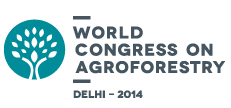CAFNET – First effort in India to value Ecosystem Services from Coffee Based Agroforestry Systems
CAFNET – First effort in India to value Ecosystem Services from Coffee Based Agroforestry Systems
wca2014-1996 Cheppudira Kushalappa 1,*Philippe Vaast 2 3Yenugula Raghuramulu 4Claude Garcia 5 6 7Fergus Sinclair 3 8 1University of Agricultural and Horticultural Sciences, Shimoga, Ponnampet, India, 2UMR Eco&Sols, CIRAD, Montpellier, France, 3ICRAF, Nairobi, Kenya, 4Coffee Board of India, Bangalore, 5Department of Ecology, French Institute of Pondicherry, Pondicherry, India, 6UR B&SEF, CIRAD, Montpellier, France, 7Forest Management and Development Group, ETHZ, Zurich, Switzerland, 8University of Bangor, Wales, Bangor, United KingdomKodagu district in South India is the largest coffee producing region in India contributing to 35% of the production under shade grown systems. These diverse coffee plantations which cover 30% of the landscape in the region not only provide valuable revenues to the rural community, but also provide vital ecosystem services to Southern India. This is particularly the case for water since the origin of Cauvery, the most important river of the region, is in Kodagu with coffee plantations covering a large area of this watershed. The opening of India to the international coffee market and related intensification of coffee production have resulted in reduction in density and diversity of shade trees and associated biodiversity.
To improve the livelihoods of coffee farming communities while conserving natural resources in three major coffee regions located in the world hotspots for biodiversity, the project CAFNET was funded by European Union from 2007 to 2011 in 7 countries. Kodagu district was the reference CAFNET site in India where a multidisciplinary team of researchers undertook studies in 38 villages in the Cauvery Watershed: 1) to document local traditional ecological knowledge, biodiversity of trees, epiphytes, mammals and birds, economics and coffee quality on 150 farms on small, medium and large farmers, 2) to disseminate information on the ecosystem services, such as water yield and carbon sequestration, provided by coffee based agroforestry systems to local and national stakeholders, 3) to formulate guidelines for sustainable coffee cultivation including agroforestry practices and 4) to help farmers in adding value to their coffee through better access to markets and eco-certification schemes with 7 farmer groups being certified by Rain Forest Alliance and/or UTZ Certified. This effort is to make coffee cultivation more attractive for future generations through sustainable agricultural management principles while sustaining the environment.

